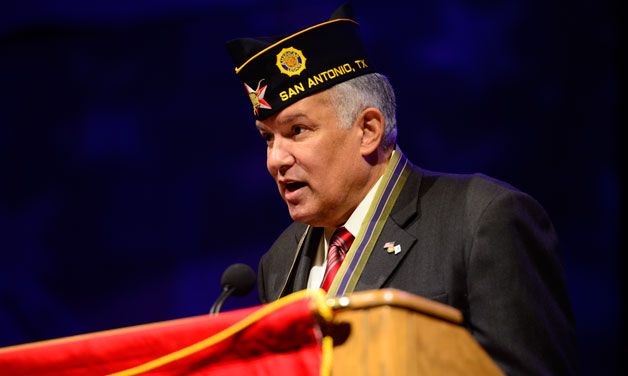USAA chief shares hiring approach

U.S. Army Maj. Gen. (ret.) Josue “Joe” Robles, chief executive officer of USAA and a veteran, addressed attendees to the 95th National Convention in Houston on Aug. 28. (Photo by Eldon Lindsay)
U.S. Army Maj. Gen. (ret.) Josue “Joe” Robles has both a personal and professional perspective about what it’s like to come home from war and search for a meaningful career. In the early 1970s, the future chief executive officer of USAA was a uniformed soldier and college student facing the same questions about the future that millions of young veterans confront today.
“We’ve come a long way since the days of Vietnam when many returning veterans were met with, at best, indifference,” Robles told thousands in Houston on Wednesday for the 95th National Convention of The American Legion. Today, he said, there is a new appreciation in society and among employers, about those who have served their country in uniform.
“More and more employers are discovering that veterans make great employees,” he said. “They’re trustworthy. They’re hard-working and mission-oriented. They’re great followers and even better leaders.” That discovery has gone a long way toward reducing the unemployment rate for young veterans in the last year, he added.
To USAA, The American Legion’s preferred provider of insurance and financial services, help landing a job is only the first step toward providing veterans and military spouses meaningful careers. “Hiring veterans or military spouses is the easy part,” he said. “Helping them discover promising careers requires more effort, but it’s absolutely well worth it.”
Robles, who rose from an Army private to a major general and now leads one of the nation’s largest and top-rated insurance and financial institutions, said USAA has hired approximately 7,300 veterans since 2005 and has “upped the ante” in the association’s recruitment program to reach a goal of no less than 30 percent of all new hires consisting of veterans and military spouses.
Over half of the recently separated U.S. military veterans happen to be USAA members, Robles said. “We have the opportunity to talk with them every day and learn about their hopes, their fears and their questions.”
With more than 1 million members of the U.S. Armed Forces expected to discharge in the coming four years, many public and private-sector employers are rightfully ramping up their veteran-hiring programs, he said. “Thousands of other organizations around the country are setting their own hiring goals, and it’s having a real impact.”
The “biggest danger,” he explained, is that the veteran-hiring movement will eventually move to the back burner. Robles said it’s important for employers to not just make the hire, but to help the veteran or military spouse grow into a career.
“The truth is we still have a lot of work to do. Hiring veterans and military spouses is only Step 1. Step 2 involves helping them find the right jobs, and the right careers, to leverage their skills and experience. If you talk to recent veterans, like we do all the time, many will tell you that they often take the first job they can find, to help make ends meet. They tell of going through two or three jobs until they find the right fit. This nomadic experience can sap their confidence and take a toll on their families. At USAA, our approach to veterans is to hire them, connect them and develop them.”
As an example, Robles showed a video of one such veteran, Master Sgt. Todd Nelson, who was medically retired after 19 years in the Army when he was severely wounded in a suicide bombing in Afghanistan. “Since his medical retirement, he has had 40 reconstructive surgeries,” Robles said.
In the video, Nelson explains that because his wounds greatly affected his physical appearance, most companies were unwilling to take a risk hiring him. “In my particular case, one employer out of dozens and dozens of job fairs and an unmentionable number of applications, reached out. Because if you can’t tell, I’ve had something pretty bad happen to me. One stepped up, and that was USAA. They took the risk.”
Today, Nelson leads USAA’s wounded-warrior recruitment program. “And he does an absolutely terrific job,” Robles said.
Nelson said in the video that it is not simply a matter of handling the changes that come with wartime experience. He said those who make a military commitment “put their lives on hold… (and) although they have a lot of intangible skills, they don’t speak the same language that the civilians have been (speaking). It’s a very challenging time for the military when they exit.”
“I’m sure many of you have vivid memories of your own journeys back to civilian life,” Robles told Legionnaires. “You know it’s not always seamless switching careers and immigrating into a completely different world, full of new variables. This adjustment can be especially tough for those who return home with wounds both physical and unseen.”
Robles said USAA and The American Legion are working together through veteran career-development programs like the U.S. Chamber of Commerce Hiring Our Heroes job fairs. “We have been honored to work alongside you in the cause of increasing the hiring of veterans and military spouses,” he said, adding that the commitment must continue. “True appreciation demands more than words. It demands action on our part. We cannot rest on our laurels.”

